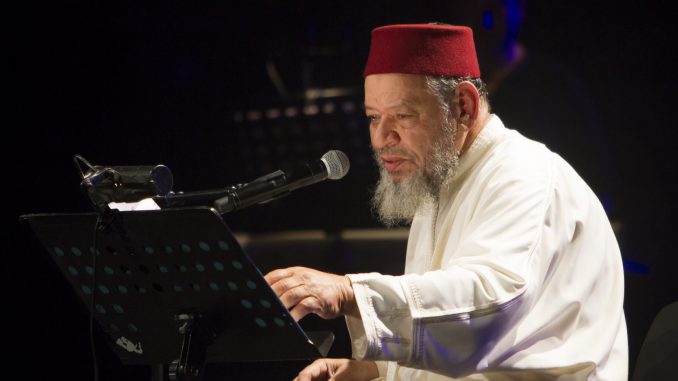
Abdelhadi Belkhayat is considered as one of the Atlas “mountains” of Morocco, and one of the greatest artists who have made the history of Moroccan song with a repertoire as rich as it is distinguished and that Moroccans, young and old, still hum to this day.
Indeed, who among us does not enjoy listening to his masterpiece “Qitar al hayat” and does not love the lyrics and rhythm of “Ya bent Annas”? Who among us does not know “Al qamar al ahmar”; “Fi qalbi jorh qdim”; “kindir a sidi”; “Hda li sorou”; “Mataqchi biya”; “Mahboubi”; “Ya dak al inssane”; “Al mounfarija”, among other masterpieces?
Abdelhadi Belkhayat is originally from Fez, where he was born, but moved to Casablanca for family reasons. He then settled in Rabat where he worked for a while, before returning to Casablanca, imbued with his passion for singing and music. He recorded his first successful song in 1960, before started climding the ladder of success, especially as he collaborated with famous songwriters and composers such as Ahmad Tayeb Laalej, Abderrafi’ Al Jawahery, Abdenbi Aljirari, Abdessalam Amer, Abderrahim Essaqat, Ali El haddani, Abdelkader Wahbi.
Abdelhadi Belkhayat immigrated to Cairo where he also shone, particularly following his notoriety in the Maghreb. He trained in the fundamentals of singing at the conservatory of the Egyptian capital, Cairo. And after several years in Egypt, he decided to return to his country, refusing to sing with a dialect other than that of his country.
Belkhayat has had some appearances in films, such as “Soukout ittijah mamnou’a” and “Dounia rharami”, filmed in Lebanon, as well as “Ayna toukhabi aana achams” whose main role was played by his colleague and fellow citizen, the musician Abdelwahhab Doukkali.
After years of glory, Abdelhadi Belkhayat decided to withdraw from the artistic world after being influenced by certain Salafist movements, but he changed his mind on a personal invitation from the late HM King Hassan II. However, few years before his death, Belkhayat decided, once again, to withdraw from the artistic scene and perform only religious songs, after having spent many years in the service of authentic Moroccan art and culture.

Be the first to comment